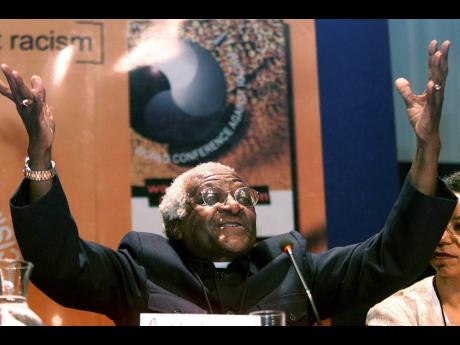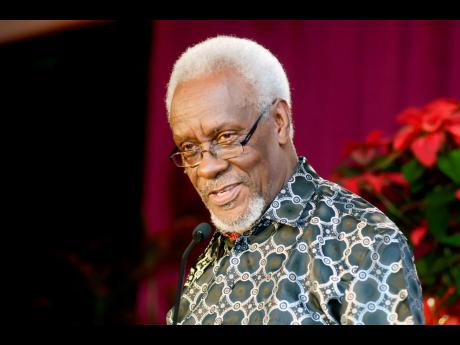Desmond Tutu: A global human rights icon passes
Tributes pour in for anti-apartheid stalwart
As tributes pour in for anti-apartheid stalwart Archbishop Emeritus Desmond Tutu, former Prime Minister PJ Patterson is recommending that his example be used to achieve consensus to tackle issues facing Jamaica. Tutu, who was a driving force for the dismantling of apartheid in South Africa, died on Sunday in Cape Town. He was 90.
Describing Tutu as an international giant with a “compelling voice”, Patterson stated during an interview with The Gleaner on Sunday: “The last surviving giant in the fight against the abhorrent system of apartheid has departed to the land of glory. Nobel Laureate Desmond Tutu found his own way of contributing to the fight against that evil and pernicious system.”
At the same time, the Caribbean Community (CARICOM) Secretary General, Carla Barnett, says the regional bloc is profoundly saddened by the death of Archbishop Emeritus Tutu.
“Archbishop Tutu’s strong moral voice was a very significant factor in the successful struggle against the brutal racist policy of apartheid in his homeland. His compassionate leadership of South Africa’s Truth and Reconciliation Commission during the sensitive transition period that followed the end of apartheid further elevated his national and global esteem,” said Barnett.
“Archbishop Tutu, a Nobel Laureate, will be remembered as an indefatigable fighter for human rights, justice, equality, and the environment whose unquestioned integrity cements his legacy as a global icon,” the secretary general noted.
And Patterson, whose tenure as prime minister coincided with the waning years of apartheid, remembers Tutu as a man who could forge consensus among diverse people. Tutu won the Nobel Prize in 1984, and a decade later, he chaired the Truth and Reconciliation Commission, which was established to unveil the atrocities committed under white minority rule.
Patterson shared that to win the battle against apartheid, Tutu had to fight on many fronts simultaneously, including on the political, economic, religious, and cultural front lines.
“He found a unique way of getting engaged in all these fields without appearing to enter the political fray. He was very gifted in the art of preaching and of writing, and he used those talents to provide that spiritual linkage, which made him a formidable force that no government of South Africa could imprison, stifle, or contain.”
LEARN FROM LIFE
Using his example, Patterson is of the view that Jamaica can learn from Tutu’s life in regards to building national unity.
“We have to begin with self-respect, and that has to extend to respect for other human beings, and we have to respect the right to life. In a democratic society, we will have differences of viewpoints, but there are some issues of crucial national importance that we have to find a way of building national consensus,” he said.
Tutu, who visited Jamaica in 1986 on the invitation of former Prime Minister Edward Seaga, was remembered for his charisma, his unmatched sense of humour, and his unbridled optimism.
“We in Jamaica will remember him for his visit with us where he felt very much at home whether in the pulpit sphere or moving among our people, and we can’t forget his wit. You better be very careful how you got into any argument because he always had a ready retort,” quipped Patterson.
Prime Minister Andrew Holness described Tutu in a tweet as “one of my personal heroes”. Holness added, “We mourn his passing, but his life, work, and example give us much to celebrate and emulate.”
His sentiment was also shared by Opposition Leader Mark Golding who tweeted that the world has lost an iconic human rights advocate who “was a leading light in achieving progress for reconciliation in the post-apartheid era”.
Jamaica’s steadfast opposition to apartheid has been a consistent pillar of its foreign policy across administrations. The country’s anti-apartheid efforts started with Jamaica being among the first nations to introduce a trade embargo against South Africa in July 1959.
These efforts culminated with the boycott of the Commonwealth Games in Scotland in July 1986 to register Jamaica’s frustration with the refusal of the United Kingdom to impose sanctions on South Africa. In August of the same year, Tutu and his family were invited to Jamaica, where he received an honorary Order of Jamaica in recognition of his activism.
On his five-day visit to the country, he was hosted by the late Governor General, the Most Honourable Florizel Glasspole. He met with Seaga and leader of the People’s National Party Michael Manley.
Minister of Foreign Affairs and Foreign Trade Kamina Johnson Smith, in paying tribute to the anti-apartheid leader, said he was a giant of a man residing in a modest frame and an outstanding leader not just in his country, but on the international stage.
“He demonstrated courage when others lost hope, never faltering in his advocacy and exemplary conduct in the service of a fairer, more just cause for equity and humanity,” Johnson Smith said.
Leading human rights activist Susan Goffe emphasised that a hallmark of Tutu’s remarkable legacy is that he was prepared to engage and lend his voice to a range of issues. She said: “The way in which he used his voice against the injustices that he saw was outstanding. Very famously, he spoke about the fact that if in the face of injustice, you remain neutral, you are actually taking the side of the oppressor.”
Goffe believes that one lesson Jamaica can learn from Tutu’s life is that power and resources should be used to support marginalised people and that a sense of compassion, humanity, and justice must permeate all aspects of society.


